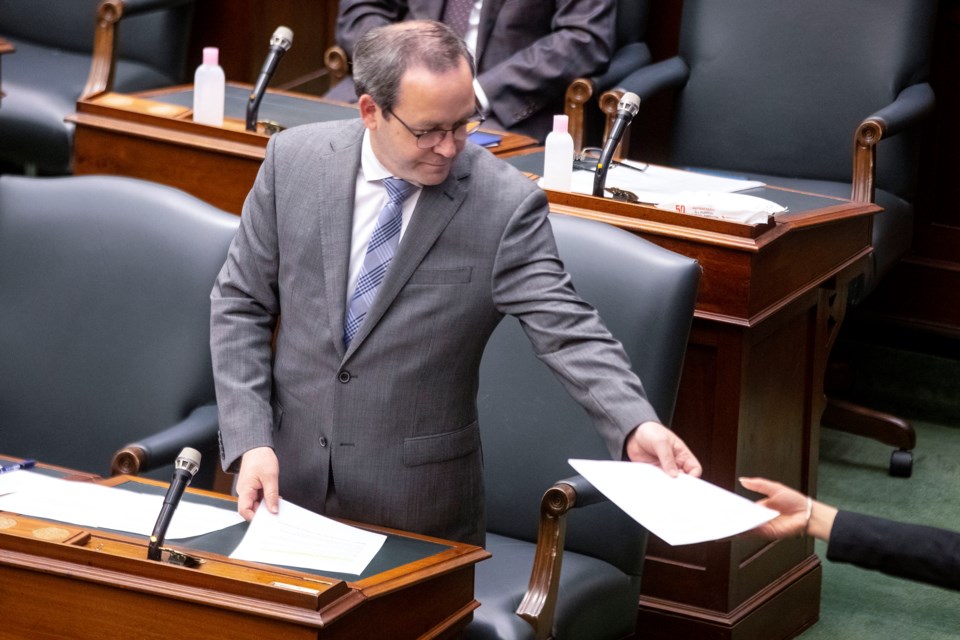EDITOR’S NOTE: This article originally appeared on The Trillium, a new Village Media website devoted exclusively to covering provincial politics at Queen’s Park.
Landlords in Ontario can be fined up to $50,000 for illegal evictions. But the Ford government won't say how often that happens, if ever.
A recent report from a tenant legal organization found that in most illegal evictions, the landlords aren't fined. And when they are, the amount is "minuscule."
The Advocacy Centre for Tenants Ontario (ACTO) searched for LTB rulings on illegal evictions from July 2020 until May of this year.
It chose July 2020 because Bill 184, another major Ford government housing bill, came into force that month. That law doubled fines for bad-faith evictions to $50,000 for individual landlords and $250,000 for corporations.
To get an LTB ruling in their favour, tenants have to file a form (T5) alleging that their landlord evicted them in bad faith.
Of the 74 T5 applications ACTO found, just 14 included a fine as a remedy requested by the tenant.
The LTB issued fines in just half of those cases. The fines ranged from $500 to $3,000, ACTO said.
Landlords are only allowed to raise rent by a few per cent per year as long as the same tenant is living there. But if a tenant moves — or is forced out — the landlord can set a new rent at any price.
The average Toronto one-bedroom rent has shot up from $2,055 to $2,513 in the past five years, according to the Toronto Regional Real Estate Board.
"A landlord would make up the cost of that fine in two months or less if they move in a higher-paying tenant," ACTO wrote in its report, which it submitted to the provincial committee considering a new housing bill. "These fines are minuscule compared to the profit a landlord could make by evicting a long-term tenant and hiking the rent."
NDP housing critic Jessica Bell asked the government how many times, over the past four years, the Landlord and Tenant Board (LTB) has fined landlords for illegal evictions and ordered landlords to let tenants back into homes they were illegally evicted from. She also asked for the average amount of the fines and how often landlords complied with the orders.
Bell submitted two written questions, which the government has to answer within 24 sitting days.
In identical responses tabled Monday, Attorney General Doug Downey noted the board is separate from the government.
"To preserve this independence, government officials are not permitted to interfere in, or comment on, tribunal processes or decisions," Downey's letter reads. It directs further questions to Tribunals Ontario.
"I hope that this information is helpful," he wrote.
The Trillium asked Downey's office how releasing the information would constitute interference or a "comment" on the LTB, but did not get a response by press time.
Downey has previously spoken about the LTB's sluggishness and pledged to fix it.
“Residents and rental housing providers deserve fast results, and government bureaucracy should not stand in the way,” said Attorney General Doug Downey.
— Doug Downey (@douglasdowney) April 6, 2023
This investment of $6.5M more than doubles the number of full-time adjudicators at the LTB. https://t.co/lfxLrYhPIb
The Trillium also asked Tribunals Ontario for the information Bell asked for, but it didn't send it by press time.
The government plans to double the existing bad-faith eviction fines to $100,000 for individuals and $500,000 for corporations. Bill 97, which would do that, is in second reading.
But the fines are meaningless if they're not enforced, Bell said.
The ACTO report is "clear evidence that tenants don't have any adequate protections from landlords who illegally evict. And it's contributing to the massive hike in rental prices across Ontario," she said.
Downey's response is "insulting" to tenants, she said. The government needs to make evidence-based decisions and show their work when called upon, she said.
Bell said she asked Downey about the non-answer after question period, as MPPs flooded out into the halls of Queen's Park.
"And he said, 'My ministry doesn't do Google searches,'" she said.



